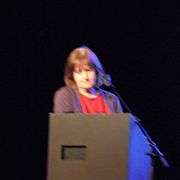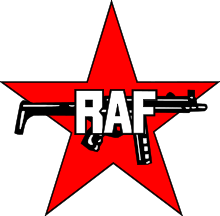Astrid Proll
| Astrid Huberta Isolde Marie Luise Hildegard Proll | |
|---|---|
|
Astrid Proll speaking in Rotterdam, the Netherlands, May 2011 | |
| Born |
29 May 1947 Kassel, Germany |
| Other names | Anna Puttick |
| Organization | Red Army Faction |
Astrid Huberta Isolde Marie Luise Hildegard Proll (born 29 May 1947, in Kassel, Hesse, the daughter of an architect) was an early member of the Baader-Meinhof Gang.[1]
As a Baader-Meinhof member
Proll was the younger sister of Thorwald Proll and met Andreas Baader and Gudrun Ensslin through him; Thorwald left the group relatively early in its history, after being involved in firebombings in Frankfurt in 1968. Proll was involved in bank robbery. She was the getaway driver for Andreas Baader when he escaped from police custody with the help of Gudrun Ensslin, Ulrike Meinhof, Ingrid Schubert, Irene Goergens in 1970.
Proll, along with Manfred Grashof, was stopped by police on 10 February 1971 but managed to get away. However in Hamburg on 6 May of the same year, Proll was finally arrested after a pump attendant at a petrol station recognised her from a wanted poster and alerted the police. She attempted to flee but was surrounded by armed officers and arrested. Once she was detained, her run-in with the police in February was turned into an attempted murder charge even though she never even fired a shot. She was imprisoned but released on health grounds (being kept in complete acoustic isolation in prison caused her health to deteriorate)[1] and transferred to a sanitorium.
On the run
While at the sanatorium, Proll was required to report to the police, but she soon escaped and went underground. Given contact details of people in London she decided to go to England, arriving there at the age of 26. In London, a marriage to Robin Puttick allowed her to obtain new identity documents as Anna Puttick. With these she obtained a variety of jobs. She worked for six months as a park-keeper for Hackney Council, and for a year in Lesney's toy factory. From there she took a Hackney Council-sponsored welding course in car mechanics, using her skills to train young and black people as part of a drug-rehabilitation initiative. During this time, she tried to maintain a low profile in spite of working as a mechanic, an atypical female occupation then and now.[1]
On 15 September 1978 Proll was discovered and arrested by the Special Branch of the police after approaching the authorities with an enquiry. She was detained and fought extradition; the case attracted both supporters and opposition. Supporters suggested that the fact that she was teaching under-privileged children mechanics in a workshop in West Hampstead was a token of her political repentance and good faith. Critics suggested that as Proll was a lesbian the marriage to Puttick could only be a "marriage of convenience". She herself decided to return to West Germany in 1979 to fight her case there.
Return to Germany
Back in Germany, Proll's attempted murder charge was dropped when it was gathered that the state had withheld information that could have cleared her but she was still sentenced to five and a half years imprisonment on account of bank robbery and falsifying documents; however, she had already spent at least two-thirds of that time in German and English prisons and therefore was released immediately. She did not rejoin the Baader-Meinhof Gang. Proll went on to study film and photography at the Hochschule für bildende Künste Hamburg and later became a picture editor for magazine and newspaper. She was the first to assign Martin Parr and Wolfgang Tilmans magazine work for the German market. Proll participated in interviews about her time in the Baader-Meinhof Gang and has published a photography-based book about the gang entitled Pictures on the Run.[2] She has worked, as recently as 1999, as a picture editor in the United Kingdom.[3]
During a radio chat show, when asked if she was "terribly ashamed" of being associated with the RAF, Proll said she was not, but went on to say that she did disapprove of their increasingly violent acts.[4] Interviewed by Iain Sinclair for his book Hackney, That Rose-Red Empire, she said that she would like to settle in Britain but did not have the money to do so.
Having previously worked as a photo editor, she is currently advising the young think tank xaidialoge on how to conceptualise democracy in a language of pictures.
See also
References
- 1 2 3 MacDonald, Eileen (1991). "German Women and Violence". Shoot the Women First. New York: Random House. ISBN 0-679-41596-3.
- ↑ "Baader Meinhof: Pictures on the Run 67-77". Amazon. Retrieved 13 July 2013.
- ↑ Conolly, Kate (6 October 2002). "Astrid Proll's journey to Terror Chic". The Guardian. Archived from the original on 24 July 2008. Retrieved 19 August 2008.
- ↑ BBC Radio Four Woman's Hour, 5 December 2007, retrieved 12 October 2008, on Listen Again at http://www.bbc.co.uk/radio4/womanshour/listenagain/2007_49_wed.shtml
Further reading
- Chapter "The Blue Fence" (featuring interview transcripts, pp. 562–70) in Hackney, That Rose-Red Empire (2009), Iain Sinclair

